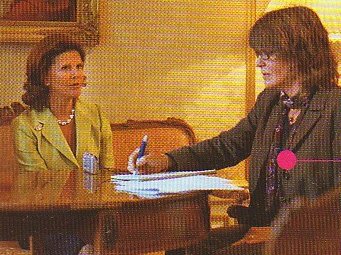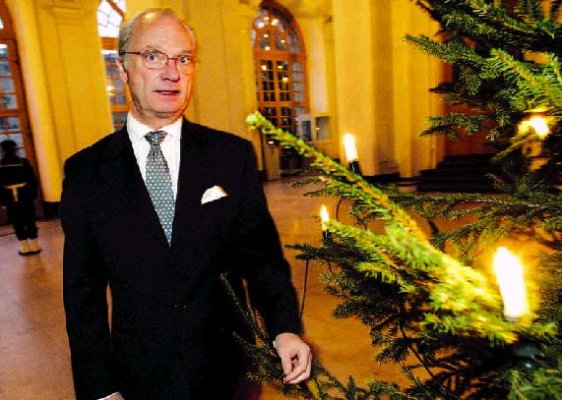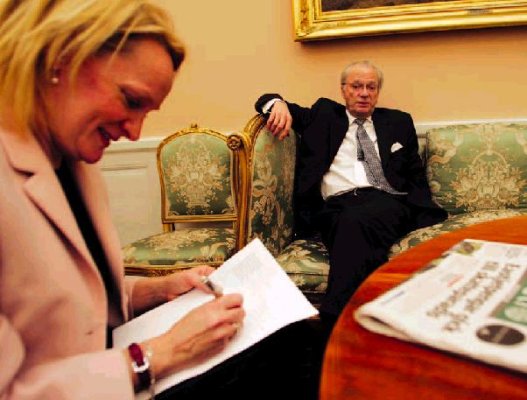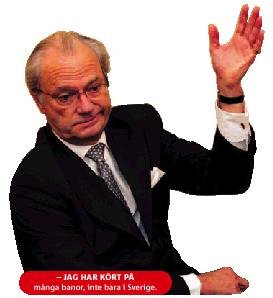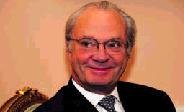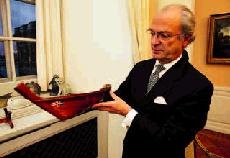Interview with the king in Sydsvenska Dagbladet part1
I have taken some time to translate an article / interview published in Sydsvenska dagbladet last saturday. It is only available in the paperedition.
The sixteenth turns sixty
Article / interview in Sydsvenska Dagbladet by Lena Rainer
On the eve of his birthday Sweden’s King Carl XVI Gustaf answers questions on humour, leadership, parenthood, public outcrys, "Hey-Baberiba"-jokes, eco-friendly cars, scouting, media – and retirement.
When Sweden’s King Carl XVI Gustaf turns sixty on Walpurgis night he will enter what is known as "the upper middle age", a time when most people start thinking about retirement and handing over to the successor....
But not the King!
- It isn’t the right and proper thing that I would retire and it is nothing i considers or discusses he says distinctively.
When we discussed the issue ten years ago in an interview on the eve of his fiftieth birthday the king joked away the question on and leaving place for Victoria and said roughly
- We Bernadottes sits for a long time and that will be a boring period for the crownprincess.
Now the King instead talks about Victoria’s right to get an education and increase her knowledge for her coming mission.
- She does that rather well, it gives her perspective and it is easier to get some distance when you have more experience.
Does the king give any royal advise?
- I haven’t got that far yet.
- The crownprincess maybe sees me as a role model, watches and wants to learn more all the time. She keeps he self informed on what happens in society and learns new things all the time. She has some ideas of her own as well of course.
A royal pensioner is nothing we will see for a while. The king by the way is not eligible for pension or sickness benefits.
That a reigning monarch gives interviews one after another on the eve of his sixtieth birthday is internationally unusual but have become a Swedish tradition after the successful attempt before the kings fiftieth birthday when the King made himself available during a month first for individual interviews with the big dailies, then the weeklies in a group as well as international media.
Then Sydsvenskan was last of the interviewing dailies. Now we are first and while we are waiting for the majesty the Kings Aide in camp Hans Tornérhjelm gives some tidbits about the King.
He tells us among other things that the King nowadays has his own pocket money (he didn’t use to have that, it was the aide in camps duty to be available and pay the kings small expenses) and that the king often listens to the radio channel P1, readily "Ring P1", where he is interested in what goes on in the depth of the Swedish people.
When the King arrives, very late which is unusual, he is very unhappy and sits down on the sofa:
- I’m sorry I got that late, but I have at an lunch test eaten a dinner menu that we might serve in conjunction with the sixtieth birthday. No no, don’t try to ask about the dishes, he says when he sees that I’m about to ask.
Royal menus are at least as secret as the menus of the Nobel dinner.
Twice before have i interviewed the king at the castle, and the environment is unchangingly the same.
We sits in a room beside the king’s office near the eastern entrance at Stockholm’s Castle. In the gold- and green patterned sofa lies as usual the button for quickly calling in bodyguards or the aide in camp if something unexpected would happen.
Period furniture, drawers with Chinese figurines and grand chandeliers, slightly drab landscape paintings and a clock which crisply tolls every half an hour gives atmosphere to the airy room.
On the windowsill is lots of animal sculptures that looks like they comes from the World Wildlife Fund and in front is the newest acquisition; a half a meter long copy of the wooden boat the king donated to the thai people after the tsunami. Above everything a cut glass chandelier with 24 candles casts a mild light.
The new press- and information secretary of the court Nina Eldh sits ready to supply facts.
The king as usual looks like an advert for the men’s style council; impeccable grey suit, white shirt, light grey silk tie with white dots on, fluffy handkerchief in the breast pocket, golden wristwatch with leather armband and a ring with a coat of arms. His hair is slightly thinner and greyer than ten years ago.
Ten years ago we wrote that he was slim as a bamboo and the slim look is well preserved. It is unbelievable that he can keep that slim considering all lunches, dinners and testeatings.
Right now in march the king keeps in shape with spontaneous ski-trips in the surroundings of Stockholm when there is an hour empty in the program, that as already been revealed by the aide in camp.
Old clichés about the king having "grown into the royal suit" and "become king for his crown" seems dusty when one remembers that he has been king for almost 33 years and thus has long surpassed his predecessor Gustav IV Adolf’s 23 years on the throne (1950-73). And it is actually only ten years until he breaks Gustav V’s record (1907-50) of 43 years as king.
The king says about entering the upper middle age and turning sixty:
- It doesn’t feel anything at all. Every day is a new day that turns into history and doesn’t make much difference.
- However the sixtieth birthday is a milestone to hang up one’s life around, both what has been and the future, before and after so to say.
- And it is a nice opportunity to thank family, near and dear, friends, the public administration and all of the Swedish people for all the support I have got since the last interview when I turned fifty.
We talks about the ten years that has past and dramatic events like World Trade Center, the Anna Lindh murder, the Tsunami and the storm Gudrun.
- So much happens during ten years and it has really happened so horrible, unpredictable and unexpected events. In the light of this we have to try to consider how we should be able to prepare our self for similar events, for the unpredictable. It is hard but we have to try.
The Royal family’s deep devotion after the tsunami manifested itself with massive presence at mourning services, manifestations, charity concerts, attending the return of the victims return to Sweden, a trip to Thailand several discreet visits to Astrid Lindgren’s children’s Hospital to comfort children that had lost their parents.
However straightest into the hearts of the Swedish people went the very personal speech when the king spontaneously told about his sympathy for the children who had lost their parents and gave his own testimony about how hard it is to grow up without a father.
From having been a scolded (Brunei) and rather manhandled monarch he suddenly stood in media as a father of the people and a uniting symbol of the country.
How did this sudden popularity feel?
The king wriggles with embarrassment and says that it is hard to describe.
- We were all in a state of shock and from this position we asked questions to each others how this horrible thing could happen.
- I felt that I wanted to try to soothe the sorrow. That is the role of the monarch in difficult situations, to as much as possible, try to unite the nation, family and all the people who has a hard time.
- I’m an impartial and non political person and unifying symbol of the country. I hope that I can unite these roles.




